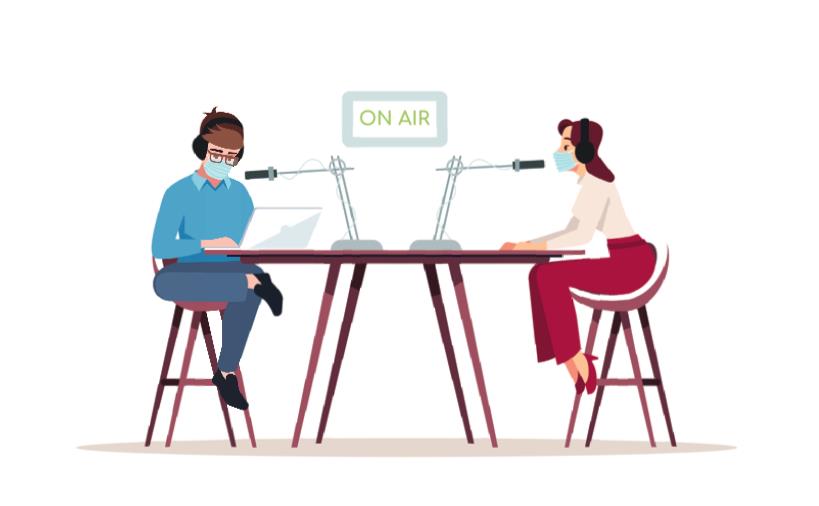COVID has presented many challenges, one of the most prominent being to the way we work and the disruption that has come with a different routine. As many people work from the kitchen table or bedroom, it’s difficult to physically escape our surroundings, with many of us are still locked down at home.
Listening to audio can be a welcome relief to the bright lights of the screen, especially for those who live alone and don’t have a human distraction.
For Kate Montague, the founder and director of podcast festival Audiocraft, which takes place this Saturday, podcasting as a medium is important at a time when people are facing isolation.
‘I think, now more than ever, people want to be connected to each other, hear stories and kind of feel a sense of being a part of a community or a part of a conversation, and podcasts are really good for that.’
‘There’s this kind of really hardcore audience engagement with a podcast and a host – there’s that kind of feeling of being a part of a family. There’s something quite special about the medium in that way,’ she admits.
Montague also notes that the kinds of programs listeners consume are changing in light of the pandemic.
‘There definitely was – I don’t know if there is now – but there was a real downturn in true crime,’ she said. ‘People don’t want to engage in heavy content, they want to be motivated by the podcast they listen to. There’s a drive towards content that will motivate and inspire connectedness, positivity, health and well being. All of those subject areas have taken a real upturn and that’s really interesting.’
Is now the time to start your podcast?
Darwin-based writer and podcast producer Johanna Bell, who is the creative director of Spun Stories, said if you have a creative idea you’ve been thinking about then now is a perfect opportunity to make a podcast, but admits the market is currently saturated, so you should question your motives before you create.
‘At the beginning of 2020, there were more than 850,000 active podcasts and something like 50 million episodes. And that was before COVID arrived! It’s bound to be higher now,’ she said.
‘If you’re making a podcast for intrinsic purposes – to explore, learn or share your work with others -– then I don’t think you can have too many podcasts. But if it’s big audience reach you’re after or you’re driven by extrinsic factors like awards or sponsorship, then now might not be the best time to create a podcast.
‘That said, if you’ve been sitting on a podcast idea for a while but haven’t had the time to get to it, and COVID has allowed you that time, then I’d say do it! It’s a wonderful way to learn and connect and you never know where a good story or idea will go,’ she added.
Read: Business as unusual: The ArtsHubbub Episode 6
Regardless of why you might want to make a podcast, one of the advantages during the current pandemic is that you can record from your home and send equipment to people you may like to interview, or record them over zoom, there’s no need to be in close range.
For those looking to improve their podcasting skills, there are plenty of options to choose from. As well as festivals like Audiocraft, the Wheeler Centre also runs mentorship programs for those who want to further their skills. They recently announced the recipients of Signal Boost, a program which invests in the craft of working with sound.
Karishma Luthria, a Sydney-based Mumbai-born and raised, radio journalist and producer, was one of the recipients. She believes we need podcasts now, more than ever.
‘I think podcasting creates an escape from reality. Podcasts focus on real stories of real people at a deep and personal level that helps listeners escape from the cynicism and realities of the world, but at the same time exposes the stark reality of the human experience. That’s what I love about podcasts the most — they are catalysts for change by starting small and going big,’ she said.
Read: Solid tips for podcasting during the time of Covid
Beth Atkinson-Quinton was one of the Signal Boost judges and is the Wheeler Centre’s audio producer. She said those who were successful with the mentorship were able to demonstrate solid ideas.
‘Applicants were really able to articulate why this opportunity was important to their practice right now. It’s really exciting because the participants we’ve ended up with come from different parts of podcasting,’ she said.
She encourages people to experiment with makes new shows, but agrees with Bell that podcasts are everywhere.
‘It’s tricky, I think, to come into a market where there’s already so much happening. But my overall thought is that it’s exciting because I think people are really starting to respect this is as a medium and as a means of engaging with an audience.’
But the way people are reacting to podcasts is changing. As Montague expressed, the type of content people now respond to has shifted, with an emphasis on content that is inspiring and connects us. And that’s something exciting for the next generation of audio makers.
‘I think there’s potential for creators to find new audiences who are, all of a sudden, looking for this kind of [uplifting] podcast content, more than ever. And also for people to play and create and have fun and experiment again. I guess that’s what i would love to see come out of it,’ she concludes.





